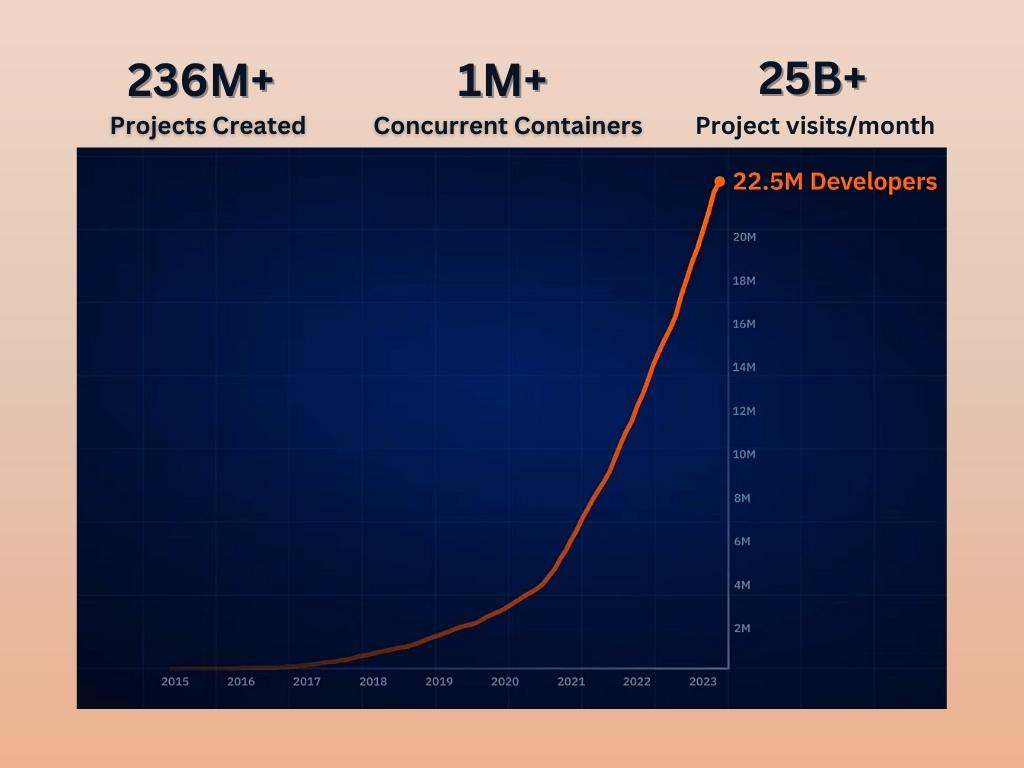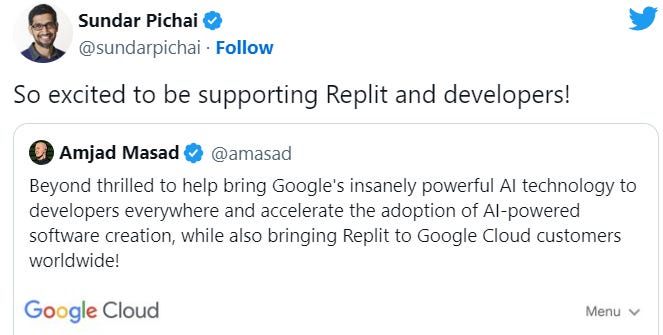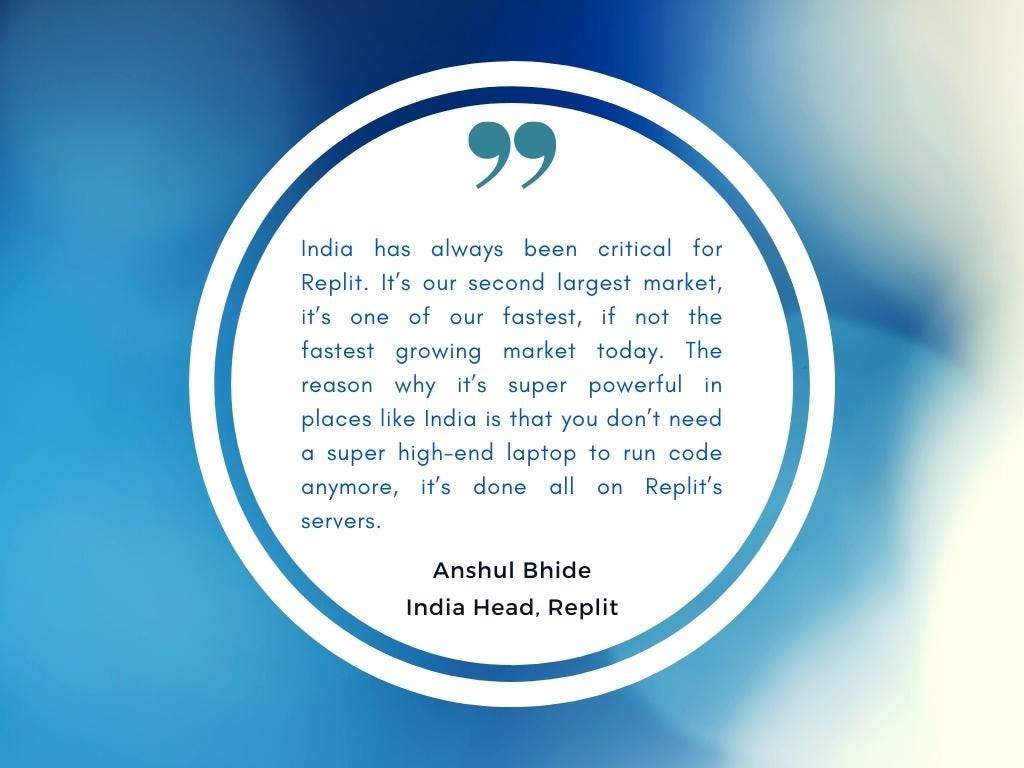Replit: Just another AI coding assistant tool or is it more than that?
As the AI craze surges unstoppable, entrepreneurs are making their move, and one name stands tall - Replit! This generative AI-tech startup has taken the world by storm with its cloud-based IDE, handling everything from building to deployment, all on its own.
But what sets Replit apart from the rest? While online IDEs have shown potential, none have soared to such heights ever. Replit has become the world's fastest-growing software development platform, with over 22 million developers calling it home.
Imagine the magic - developers can effortlessly set up any environment, releasing fully functional live apps in mere seconds, anywhere and on any device, all thanks to the power of AI integrated deep into the Replit’s platform.
Their outstanding growth has propelled them into the unicorn club, raising a remarkable $202 million in a Series B funding, boasting a valuation of $1.2 billion. With 17 investors, including big names like Coatue and SVA, betting on this AI wizard, Replit is assumed to reshape the coding landscape. But will it really make it big or pass down as just another online code-editor?
Let’s dig deep and find out what is all that’s happening with Replit, making it roar like the next big-thing!
👉Replit’s struggle before joining hands with Google🤝
Replit shared a fair share of challenges before gaining all this popularity. Since Amjad Masad, Replit’s CEO, lacked special connections with powerful giants like Microsoft or OpenAI, gaining access to newer LLM models to build a Copilot competitor was a hurdle.
He had experimented with code generation using GPT-2 when it was released in 2019, but it was GPT-3's launch that truly revealed its potential. However, Replit encountered limitations due to OpenAI's strict guidelines on productization.
Creating a tool like Copilot required significant low-level engineering and be really fast. Replit, lacking those resources, had to wait until models were open-sourced to make progress.
It was only after the recent alliance with Google that Replit has been feeling confident about its mission to democratize technology and empower developers with advanced tools to “accelerate tech for everyone”.
👉Google’s Partnership with Replit: A Calculated Move Against Microsoft's GitHub?
The goal of the partnership is to transform "non-developers into developers." Through this collaboration with Google, Replit gains complete access to Google Cloud's infrastructure and their machine learning platform, 'Vertex AI.'
Replit’s intentions behind the partnership:
Make non-developers into developers, turning natural language to code
Turn software engineers to hyper-productive “10X engineers”
Make 10X engineers 1000X engineers, coding complex-architected software in 1/1000th of the time.
Although, as direct as it may seem, Google has pure intention to give Microsoft-powered GitHub a tough competition through Replit. And with all the headlines Replit is making these days, Google is already doing it pretty smartly.
🚀Ghostwriter AI: The Feature that led Google to Replit
Replit, a seemingly ordinary online collaborative IDE supporting various programming languages, became a tech magnet for none other than Google. But what really grabbed Google's attention was their standout feature called "Ghostwriter”, in October 2022.
Ghostwriter leverages LLM, an AI model fine-tuned by Replit using publicly available code. Much like GitHub's Copilot, Ghostwriter works by providing code suggestions and explanations based on what users type and their account details, including the programming languages they use.
It was the perfect opportunity for Google to join hands with Replit to stand tall against Microsoft’s GitHub. No wonder it became the driving force behind Replit's explosive growth, scoring them a sought-after partnership with Google Cloud and amassing a user base of over 22 million developers.
🚀Ghostwriter Chat: The ChatGPT-like bot for coders!🔥
Replit has been actively integrating artificial intelligence into its platform, making it to the top of the headlines always.
Soon after the launch of their Ghostwriter, that serves as a code companion, they again made something so sensational that alerted its competitor, Microsoft GitHub.
Replit unveiled a chatbot for Ghostwriter, aptly named 'Ghostwriter Chat,' making it the first conversational AI programmer to offer an interactive experience similar to ChatGPT. GitHub’s Copilot was so affected by Replit’s chatbot, that just after a month, they announced theirs too.
🚀Smart Geographical Targeting: The Hub of Mobile Phone Users
Out of a total of 27 million developers, India is known to host 5 million of them. And that’s where Replit’s marketing team has found India to be the top target market for them.
Also, mobile phones are one of Indians’ most preferred interface with the net, and this preference is working in Replit’s favor. Since mobile phones penetration has over 66.2% of the population, while PC devices has only reached to a 22% of the urbans.
📶 They have a unique product market fit in India, primarily because it caters uniquely with the needs of the users:
mobile over desktop
obsession with learning how to code
🚀Replit and GitHub: The Battle of the Behemoths
In the realm of similar functionalities, GitHub stands as Replit's closest competitor. Launched back in 2008, Microsoft's GitHub boasts a massive user base of over 94 million developers. In contrast, Replit, a relatively new player founded in 2016, has managed to attract over 22 million developers. With the backing of Google Cloud, Replit has set ambitious goals to support "one billion software creators" and facilitate companies in fostering development using AI.
Although both platforms offer similar functionalities, Replit's Ghostwriter has a competitive edge over GitHub in certain aspects:
Notably, Replit provides a "real-time multiplayer editor" option, allowing users to collaborate seamlessly.
Additionally, users can conveniently build, test, and deploy directly from the browser, which is an exclusive feature to Replit.
Another unique functionality is the integration of 'voice commands' in the Replit app. Users can issue voice prompts such as "make an app" for specific requirements, and the application will not only comply but also provide the corresponding source code, allowing for further customizations if needed.
Sure thing! Replit is putting in a lot of effort to become a top-notch online IDE platform. They've got an impressive range of support for over 50+ programming languages, which is awesome! But there’s some barriers that’s holding them from reaching their full potential.
🔴The main requirement of a stable internet connection has been a major deterrent for many devs. This challenge becomes even more pronounced as Replit seeks to cater to the rural audience in India. Regrettably, regions with inadequate connectivity present a significant obstacle to widespread adoption.
🔴Their mission to turn non-devs into devs, students into coders is evident from the free and paid plan the platform offers. They are restricting themselves for collaborative projects by providing limited resources, including CPU and memory.
Long story short, Replit's goal of surpassing Microsoft's GitHub is no small task. However, the Google collaboration is a game-changer. Right now, it's an ideal option for developers working on side projects or learning. For large-scale enterprise projects, they still have some ground to cover.
Thanks for reading TechVerse! Sign up now to receive new tech updates directly in your inbox.
Suggested Readings:
Our previous stories like these on tech innovation:
Techverse is our personal itch to discover exciting new tech products. Share these stories with your friends or colleagues here on Twitter or WhatsApp.
Cheers,
Team TechVerse











